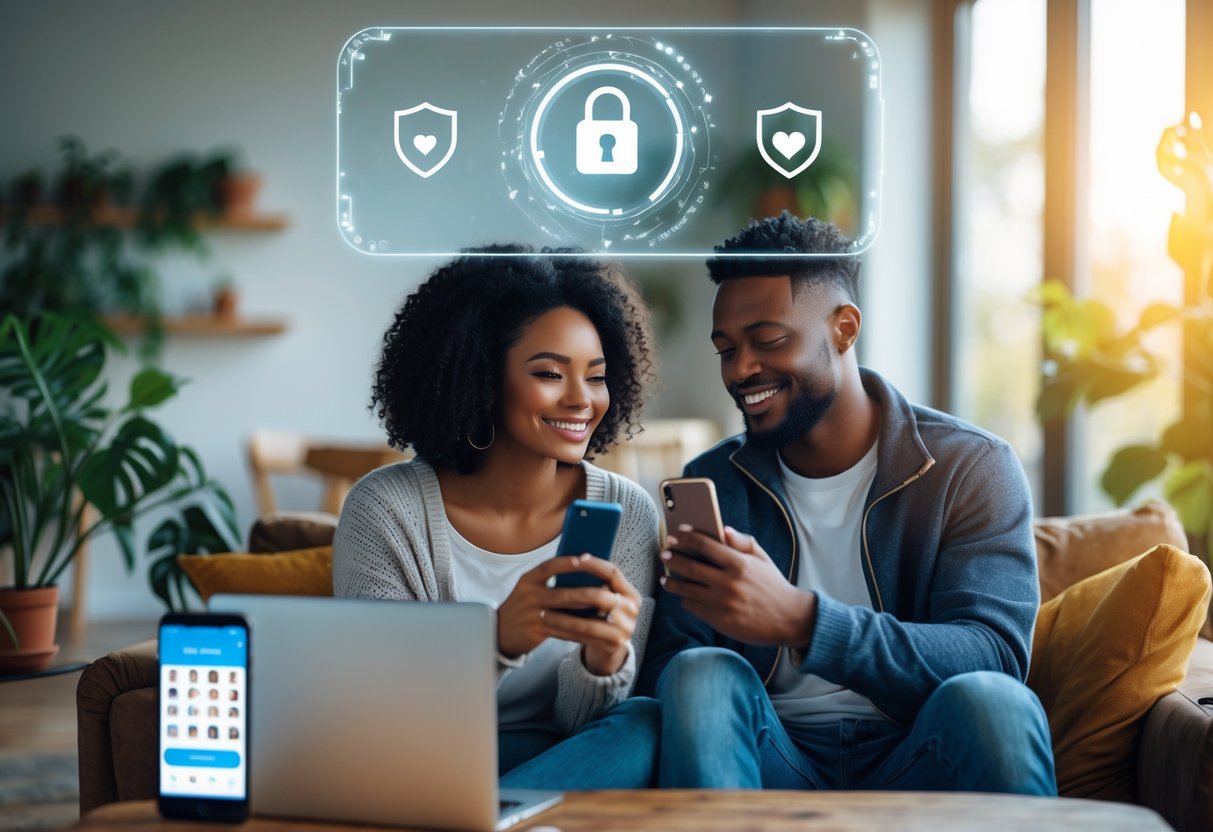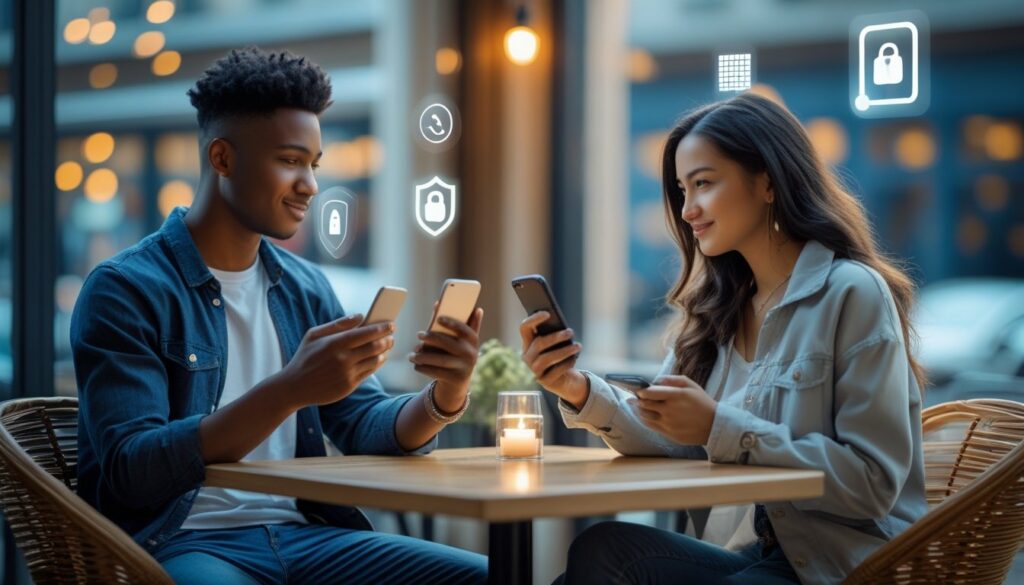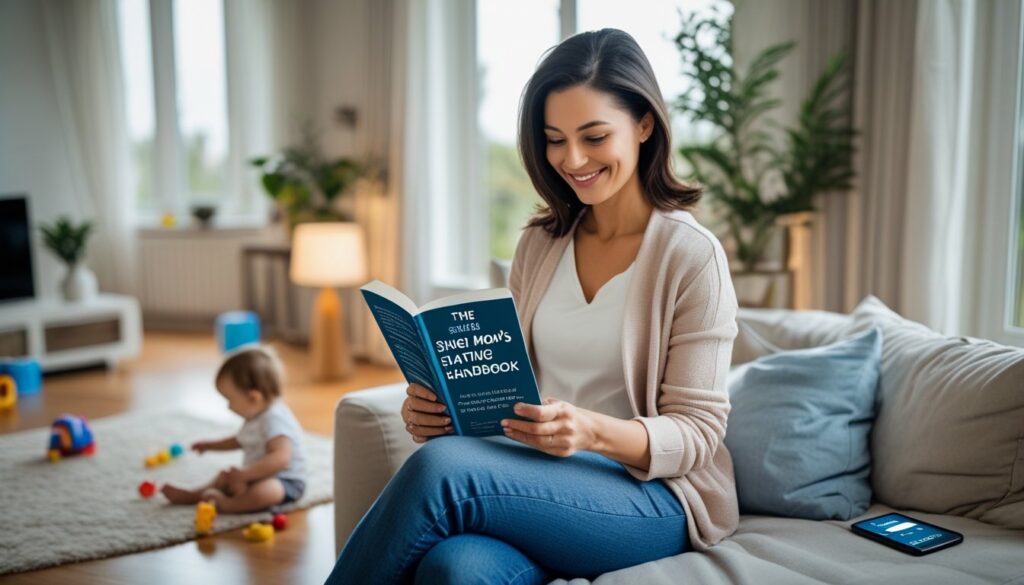Dating in today’s digital world can feel overwhelming. Every swipe, message, and coffee date leaves a digital trail that can affect your safety and peace of mind.
You want to find love without revealing too much about yourself too soon.

You can protect your privacy by setting clear boundaries about what personal information you share and when. Be smart about your online presence, choose safe platforms, and learn how to communicate safely.
You can find meaningful connections while keeping your private life secure.
Protecting your privacy doesn’t mean being secretive or dishonest. It means being careful and strategic with your personal information until you trust someone.
Key Takeaways
- Set clear boundaries about personal information sharing before you start dating online or offline.
- Choose dating platforms that offer strong privacy controls and focus on user safety.
- Use secure communication methods and wait to share sensitive details until you build trust.
Why Privacy Matters in Modern Dating

Privacy protects your personal information and emotional well-being as you build new relationships.
The difference between being private and secretive shapes how healthy your relationship becomes.
The Importance of Privacy in a Relationship
Privacy in a relationship gives you space to be yourself.
You need time to process your feelings without sharing every detail with your partner right away.
When you keep some thoughts private, you maintain your sense of self. You don’t have to share every random thought or past experience immediately.
Your mental health improves when you have privacy. You can solve problems at your own pace and talk to friends or family without guilt.
Privacy also stops you from oversharing too early. New relationships feel exciting, but sharing too much personal information quickly can cause regret.
Setting boundaries around your privacy helps you respect yourself. When you value your own privacy, you also respect your partner’s need for space.
Privacy Versus Secrecy: Key Differences
Privacy and secrecy are different. Privacy means choosing what to share and when.
Secrecy means hiding things that could hurt your relationship.
Privacy looks like this:
- Not sharing your phone passcode immediately
- Keeping some friendships separate from your dating life
Secrecy looks like this:
- Hiding conversations with ex-partners
- Lying about where you’ve been
Privacy builds trust over time as you share more. Secrecy breaks trust and creates distance.
The main difference is intention. Privacy protects both people in the relationship, while secrecy usually protects only one person.
Benefits of a Private Relationship
A private relationship stays stronger because outside opinions don’t interfere.
When you keep relationship details private, you and your partner can solve issues together.
You avoid unnecessary drama by not sharing every detail with friends or social media.
Private relationships also protect you from public embarrassment. If things end, you don’t have to explain the breakup to everyone online.
Your partner will trust you more when you keep things between you two. This creates a safe space for honesty.
Privacy lets your relationship develop naturally. You can focus on what matters to you and your partner, not what others expect.
Establishing Boundaries for Personal Privacy

Setting clear privacy boundaries protects your personal space while you build trust with your partner.
You need to know what information you want to keep private and how to share these limits.
Recognizing Your Privacy Needs
Think about what parts of your life you want to keep to yourself. This might include your phone, social media accounts, or certain friendships.
Everyone has different comfort levels with sharing. Some people are open, while others need more personal space.
Common privacy areas to consider:
- Phone and text messages
- Social media passwords
- Past relationships
- Family issues
- Work problems
- Financial information
Ask yourself which topics make you uncomfortable. Notice when you feel like someone is crossing a line.
Your privacy needs might change as your relationship grows. What feels too personal at first might become easier to share later.
Write down your main privacy concerns to understand your own boundaries.
Communicating Privacy Boundaries With Your Partner
Start these conversations early in your relationship.
Use “I” statements when explaining your needs. For example, say “I need some privacy with my phone.”
Ways to communicate boundaries:
- Be direct but kind
- Explain why something matters to you
Listen to their concerns too and find compromises when possible.
Your partner might not understand all your boundaries at first. Give them time to adjust and remind them gently when needed.
A good partner will respect your boundaries, even if they don’t fully understand them.
Remember that maintaining privacy in a relationship is healthy.
You don’t have to share everything to prove your love.
Balancing Openness and Independence
You can be close to someone while still keeping parts of yourself private.
Healthy relationships need both connection and individual space.
Share important things that affect your relationship. Keep private things that only matter to you.
Signs of good balance:
- You feel comfortable sharing big news
- You still have your own friends and hobbies
Your partner respects your private time, and you don’t feel guilty about having boundaries.
Don’t use privacy to hide problems or avoid tough conversations. Healthy boundaries are different from secrets that hurt your relationship.
Check in with yourself often. Are you sharing enough to build trust? Are you keeping enough privacy to feel like yourself?
If you’re constantly worried about boundaries, talk to your partner about finding a better balance.
Navigating Discreet Dating

Discreet dating takes careful planning to protect your privacy and control who knows about your romantic life.
You’ll need to balance genuine connections with smart privacy practices and manage how you interact in public.
What Is Discreet Dating?
Discreet dating means keeping your romantic relationships private from certain people or groups.
You might choose this if you’re a public figure, work in a conservative environment, or value your privacy.
This dating style protects your personal life from unwanted attention or judgment.
Common reasons people choose discreet relationships:
- Professional concerns about workplace gossip
- Family disapproval of dating choices
- Public scrutiny due to fame or position
- Personal preference for privacy
- Religious or cultural considerations
Discreet dating means planning where you meet, how you communicate, and what you share online.
Find someone who respects your need for privacy. They should understand why discretion matters and follow agreed-upon boundaries.
Safeguarding Identity in Discreet Relationships
Start by choosing the right dating platforms. Use apps that limit profile information or offer better privacy controls.
Create a separate email address for dating apps to keep your dating life separate from your main accounts.
Essential privacy steps:
- Use a nickname or first name only
- Avoid photos that show your workplace or home
Turn off location sharing features. Disable social media connections on dating apps.
Be careful about what photos you share. Remove metadata from images and avoid pictures with identifying details.
Consider using a Google Voice number for initial conversations. This protects your real phone number.
When meeting someone new, suggest public places that aren’t connected to your regular routine.
Managing Public Interactions and Social Circles
Plan your dates to avoid running into people you know. Choose restaurants or activities in areas where you’re less likely to see colleagues, friends, or family.
If you see someone you know, have a simple explanation ready. You can introduce your date as a friend or colleague.
Smart public interaction strategies:
- Arrive and leave separately when needed
- Choose low-key venues over trendy spots
Avoid posting photos together on social media. Use cash instead of cards at shared locations.
Talk with your dating partner about boundaries early. Discuss what public interaction you both feel comfortable with and what should stay private.
Consider keeping some activities completely private. Home dates, private events, or out-of-town trips give you more freedom to be yourselves.
Regular communication about comfort levels and boundaries helps ensure both people feel good about the arrangement.
Choosing Secure Dating Platforms

The right dating platform protects your personal information while you look for meaningful connections.
Look for apps with strong privacy controls, end-to-end encryption, and clear data policies.
How to Evaluate Dating Platform Privacy Features
When you choose a dating app, check what privacy tools it offers.
Look for platforms that let you control who sees your profile and photos.
Essential Privacy Features to Look For:
- Photo verification systems
- Block and report functions
Choose apps with location hiding options and profile visibility controls.
Two-factor authentication adds extra security.
Read the app’s privacy policy before signing up. Some dating platforms sell your data to third parties.
Check if the app uses end-to-end encryption for messages. This means only you and your match can read your conversations.
Look for apps that don’t require Facebook login. Connecting your dating profile to social media can expose more personal information.
Top Dating Apps for Privacy-Minded Users
Some dating apps protect user privacy better than others. Here are some secure options:
Raya uses a strict verification process. You need an invitation, and they review every profile.
Bumble offers incognito mode so only people you swipe right on can see your profile. You can blur your photos until you match.
Hinge hides your profile from Facebook friends automatically. You can also pause your profile without deleting your account.
Coffee Meets Bagel limits daily matches, which reduces your exposure. They delete inactive accounts regularly.
Avoid apps that ask for too much personal information upfront. The best platforms let you share details as you build trust.
Tips for Creating Anonymous Dating Profiles
Attract matches with your profile, but avoid revealing too much personal information. Start with basic details and add more as you feel comfortable.
Profile Photo Guidelines:
- Use recent photos that don’t show work uniforms.
- Avoid pictures taken near your home or workplace.
Remove any photos that display license plates or addresses. Choose photos that don’t appear on your social media accounts.
Pick a unique username that doesn’t match your other online accounts. Avoid using your real name or any nickname your friends know.
Write your bio without sharing your exact job title or company name. For example, say “teacher” instead of “5th grade teacher at Lincoln Elementary.”
Turn off location services when not using the app. Many platforms track your movements and can reveal your daily routine.
Create a separate email address for dating apps. This prevents matches from finding your other social media accounts through email searches.
Digital Communication and Privacy

Protect your digital conversations when dating online. Use encrypted messaging apps and private communication channels to keep your information safe.
Using Encrypted Messaging Apps
End-to-end encryption protects your messages so only you and your dating partner can read them. Even the app company can’t access your conversations.
Signal is a top encrypted messaging app. It scrambles your messages so only the intended recipient can read them.
WhatsApp also uses end-to-end encryption by default. Telegram offers encrypted chats through its “Secret Chat” feature, but you need to turn this on manually.
Popular encrypted messaging apps:
- Signal
- Telegram (Secret Chat mode)
- iMessage (iPhone to iPhone)
Avoid using regular SMS texts for sensitive conversations. Phone companies can read these messages, and hackers might access them.
Creating Private Communication Channels
Set up separate communication methods that don’t connect to your main accounts. This gives you more control over your privacy.
Create a new email address just for dating apps and online conversations. Services like ProtonMail or Tutanota offer better privacy protection.
Get a Google Voice number instead of sharing your real phone number. You can delete this number anytime if you need to.
Use dating app messaging systems before moving to personal platforms. This keeps your real contact information private until you trust someone more.
Steps to create private channels:
- Set up a separate email account.
- Get a virtual phone number.
- Use encrypted messaging apps.
- Keep personal social media accounts separate.
Avoiding Privacy Pitfalls on Social Media
Your social media profiles can reveal a lot about you. Check your privacy settings regularly to control what dating partners can see.
Turn off location sharing on all social media apps. This helps prevent people from tracking where you live or work.
Don’t post photos that show your address or workplace. Details like street signs or building names can give away your location.
Privacy settings to check:
- Location sharing (turn off)
- Profile visibility (friends only)
- Photo tagging permissions
- Contact information display
Be careful when accepting friend requests from new dating partners. They might see old posts or personal information about your family and friends.
Review your old posts before dating someone new. Delete anything too personal or embarrassing.
Practical Tips for Maintaining Privacy While Dating

Protect your personal information while dating by planning ahead and making smart choices. Select safe meeting spots, share only what you feel comfortable with, and secure your online presence.
Selecting Private Meeting Locations
Choose public places like coffee shops, restaurants, or parks for early dates. These locations offer both safety and privacy.
Avoid places where you are a regular or where friends might see you. This helps keep your dating life private.
Don’t invite someone to your home or visit theirs on first dates. Sharing your address gives away too much personal information.
Meet in neighborhoods away from where you live or work. This adds extra protection for your privacy.
Safe Meeting Spots:
- Busy coffee shops
- Popular restaurants
- Public parks during daytime
- Movie theaters
- Museums or galleries
Group activities, like double dates or group events, can help maintain privacy. They also make it harder for someone to focus on gathering your personal details.
Protecting Personal Information During Dates
Share basic information slowly. Your first name and general job field are usually enough at first.
Keep conversations focused on interests and hobbies. Talk about movies you like instead of your school or workplace.
Information to Avoid Sharing Early:
- Full name and address
- Specific workplace or school
- Financial details
- Family member names
- Daily routines and schedules
Use a Google Voice number or dating app messaging instead of your real phone number. This keeps your actual contact information private.
Watch what you reveal in photos and on social media. Background details can give away your location or lifestyle.
If someone asks for personal information too quickly, consider it a red flag. Build trust slowly over time.
Monitoring and Updating Privacy Settings
Check your social media privacy settings before you start dating.
Make sure your profiles only show what you want potential dates to see.
Key Privacy Settings to Review:
- Facebook: Hide your friends list and personal posts.
- Instagram: Switch your account to private.
- LinkedIn: Limit your profile visibility.
- Snapchat: Turn off location sharing.
- Twitter: Protect your tweets.
Search for yourself online to see what information appears publicly.
Remove or update anything that reveals too much about your private life.
Update your dating app settings to control who can see your profile.
Many apps let you limit matches by age range or distance.
Use different photos on dating apps than on your other social media.
This makes it harder for people to find your other accounts through reverse image searches.
Review your privacy settings every month.
Apps and websites often change their policies, which can affect your privacy.
Turn off location services for dating apps when you are not using them.
This step prevents others from tracking your exact location throughout the day.



